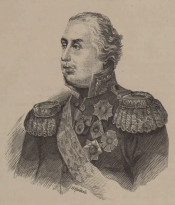
Kutuzov's unique talents: brilliant military leader, skilled diplomat, judge of character
The great Russian commander, His Sovereign Prince Mikhail Illarionovich Golenishchev-Kutuzov-Smolensky who defeated Napoleon was born in St. Petersburg on September 16, 1745. The Presidential Library’s electronic collection contain many unique materials related to the life story of the legendary Field Marshal. Most of them are presented in the public domain on the organization’s Internet portal as part of the special collection “The Patriotic War of 1812”.
The deeds and exploits committed by our army under the leadership of Kutuzov are widely known. However, few people know about the youth of the military leader, about the science that became the foundation of the future glory of Mikhail Illarionovich. The Presidential Library’s materials will help to increase the knowledge.
The book “Field Marshal Kutuzov” (1947), for example, details about the service of the future victor of the Patriotic War under the leadership of Alexander Suvorov.
The editor of the aforementioned publication, N. M. Korobkov, quotes Suvorov’s report on the capture of Ishmael, where the prominent commander speaks about the talents and valor of his subordinate.
The future victories of Prince Golenishchev-Kutuzov were based on the many years of experience that he gained during his service in various ranks. Here is what is reported in the book “Field Marshal Kutuzov”: “The thirty-year period of Kutuzov’s military service, filled with almost continuous battles and campaigns, revealed his remarkable features of a talented commander. Kutuzov turned to be a skilled tactician, combining courage and determination with discretion, a thorough study of the combat situation. These qualities of him, excellent knowledge of the troops and all the details of military affairs, and combat training played the largest role in the development of a mature and experienced commander”.
Many readers of the Presidential Library would like to know that Kutuzov had other notable qualities. For example, he was a respected and capable diplomat. He served as plenipotentiary ambassador of our country in Turkey. During the aggravation of relations between Russia and Sweden, it was Mikhail Illarionovich who was entrusted to accompany the Swedish king in order to achieve an alliance with Prussia - Kutuzov was sent to Berlin. At one time, he also held a number of major administrative posts: he was the Governor-General of Kazan, Vyatka, Kiev, Lithuania, served as the St. Petersburg Military Governor and the Commander-in-Chief of the Ground Forces, Flotilla and Fortresses of Finland. The prince also proved himself remarkable in his teaching work: he led the Shlyakhetsky Ground Corps, the main educational institution that trained officers. He lectured on literature there.
A lot of materials stored in the Presidential Library’s collections are devoted to a detailed analysis of the military tactics of Mikhail Kutuzov. His main principle in the conduct of the battle was to prevent unnecessary loss of life. The publication "Kutuzov in 1812" (1942) reports that the prince had "... a rare ability to achieve victory with "little blood", to achieve it not simply by a surpassing of forces, victims, even technical means and valor of troops, but by combination and conversion against the enemy of all conditions of the war, all its features. In the strategic system of Kutuzov, it was not only the clash of the armed masses that decided and not only the tactically perfect use of their forces. In the course of the war, where battles are the key stages, he directed all his energy to the final rout of the previously weakened and exhausted enemy and achieved this at the cost of “little blood”, while fully preserving the fighting efficiency of his army.
Speaking about the many-sided Kutuzov’s nature, one cannot but note his deep understanding of human psychology and his ability to use it for the common good. This talent of famous military leader was developed almost as brilliantly as the military: “Contemporaries and the immediate offspring failed to adequately appreciate the true greatness of this very Russian of the Russian commanders. They were deceived by his phlegmatic manner, which hid a calm, deep clarity of mind, restraint and composure of mathematical calculation; they saw his good-natured Russian cunning and did not notice insight, ability far ahead and correctly foresee the course of events; they noted either his indifferent compliance or incomprehensible obstinacy and did not see behind this a philosophical neglect of trifles that did not have significant significance, an unwillingness to fight for the impossible, and at the same time, unwavering firmness in what he considered important, necessary and feasible”, - they write authors of the book "Kutuzov in 1812".
But, in fairness, it is worth saying that among the contemporaries of Kutuzov there were still those who managed not only to discern the unique talents of the great Russian commander, but also to tell their descendants about them. The last of the family of Counts Potemkin, Sergey Pavlovich, in the year when Golenishchev-Kutuzov passed away, according to the essay “Thoughts at the Tomb of General Field Marshal of the Serene Prince Mikhail Golenishchev-Kutuzov-Smolensky” (1813). There are such words in it: “Pozharsky was a wise and brave leader, and set an example of generosity. Minin’s memory is still awestruck for a day, and his love of the fatherland is an example... But when I say that Prince Smolensky surpasses all three of these men, I will not say anything false, I won’t increase anything; for he had all their virtues in totality”.

